Cap'n, there be Wales here
Yes, it's true, I do think of the double entendre often when I here phrases about whales. For those of you who don't know, Bristol is very close to the Welsh border, separated only by the Severn Estuary. In fact, the house we're trying to buy (that's another blog on another day) looks out over the estuary with the Welsh hills beyond. There are two major bridges which cross the Severn near Bristol - the Severn Bridge and the Second Severn Crossing. The Welsh being the brunt of English jokes (a bit like Aggies in Texas), the irony is that there is only a toll going into Wales (£5 for cars).
The Monday before US Labor Day was a bank holiday here in the UK. Bank holidays are public holidays. I'm not exactly sure if they're all tied to specific celebrations or memorials like they are in the US. The one before Labor Day is called (Late) Summer Bank Holiday. Anyway, needless to say, everyone tries to go away for the long weekend, just like they do in the States. On the Tuesday prior to the bank holiday weekend, Richard decided he needed a break from work, and so proposed we go away on the Sunday-Tuesday nights to North Wales. For me, any excuse to travel and see something new and I'm on it. I found a place which was cheap, available, and didn't
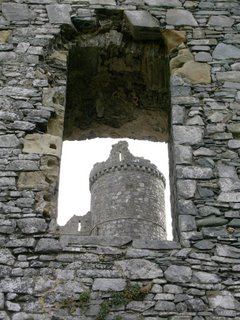
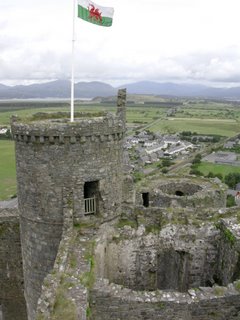 look too bad in a town called Harlech, right on the sea. Our hotel was a pub bed and breakfast sitting in the shadow of Harlech Castle. Harlech itself is on the edge of Snowdonia National Park.
look too bad in a town called Harlech, right on the sea. Our hotel was a pub bed and breakfast sitting in the shadow of Harlech Castle. Harlech itself is on the edge of Snowdonia National Park.Now that you're oriented (or orientated, as the English say, much to the irritation of my ears), I must wax poetic about Wales. Most Americans don't know much about Wales. If they think of the wild beauty of Great Britain (the island with England, Wales, and Scotland), they think of the
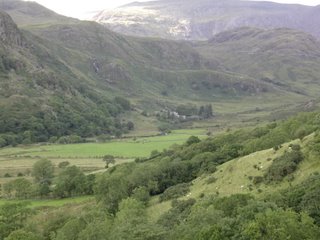 Scottish Highlands, the Lake District, or the moors. I personally know 2 people who are completely smitten by Scotland (you know who you are :-). I have been to some of the wilder parts of Scotland, to the Lake District, and to the moors, but I prefer Snowdonia National Park. It is beautiful, it is not built up, it's not too crowded with tourists, it has more trees, and it's close. OK, that's not very poetic, maybe when I get around to downloading my pictures, I will post a few of the more choice ones.
Scottish Highlands, the Lake District, or the moors. I personally know 2 people who are completely smitten by Scotland (you know who you are :-). I have been to some of the wilder parts of Scotland, to the Lake District, and to the moors, but I prefer Snowdonia National Park. It is beautiful, it is not built up, it's not too crowded with tourists, it has more trees, and it's close. OK, that's not very poetic, maybe when I get around to downloading my pictures, I will post a few of the more choice ones.The thing about Wales as viewed by an American is that it is what we might expect England to look like, in an old and quaint sense. I believe this is because Wales was so poor in the 20th century, they did not have the industry moving in, razing the old buildings and villages and building ugly boxes. Also, in defense of English cities, they didn't get the bomb raids that many English cities endured, and so didn't have the rapid rebuilding dilemma that places like Bristol had to contend with. Even now, there is the big dig in the center of Bristol, trying to improve on the human scale and aesthetics in the shopping and commerce areas. But I digress. Welsh towns and villages are incredibly quaint and old. Streets are narrow, there are many pedestrian zones, and it all looks so picturesque. The dialect is a charming singsong sounding English, and many people speak Welsh. That last line may sound a little like stating the obvious if you don't know anything about Wales and its history. But, as my husband put it, 30 years ago you wouldn't have seen nor heard any Welsh. For many many years, the language was dying due to a combination of government suppression, dilution of the people, English media, and lack of funds to support the language. With the advent of self-government, Welsh has exploded with translations as mandatory, Welsh taught in schools, Welsh radio and television, etc. You hear people conversing in Welsh everywhere. It really feels like a foreign country, and I know if I lived there, I would learn the language.
And that's the kicker. We in the US don't really have a sense of the level of division between the countries in the United Kingdom. All we have are states, which are political entities, not ethnic. Even though California feels like it's another country, it's nothing like crossing the Severn. Having been there, it's amazing to think that these folks didn't have self rule until the last 10 years. Edicts came from London with relatively little representation (incidentally, the same is true of Scotland, though they've had self rule a bit longer). It appears that the Welsh have taken this opportunity and run with it. Compared to the times I went to Wales before self rule, it's an astonishing change. They must have been chomping at the bit. I'm just waiting for the secession...
The Welsh are getting their own back, though. It has a booming tourist industry, particularly from the English, and they charge for every little thing you could possibly imagine. Inspired by the innumerable sheep blanketing the landscape,
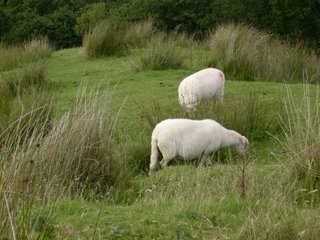 I nicknamed Wales "The English Fleece".
I nicknamed Wales "The English Fleece".More about the Welsh language: it's extremely awkward to read. For example, we took a steam train trip on the Ffestiniog railway.
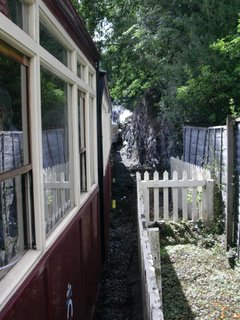 The photo of the landscape further above was taken while driving over the Llanberis Pass. And those are just about the easiest names we had to deal with. Here are some more difficult examples: Betws-y-coed, Cwmbran, Bryngwyn, Cefn Cribwr, and the infamous Llanfairpwllgwyngychgogerychwyrndrobwllllantysiliogogogoch, which is arguably the longest place name in the world. Years ago, there was a comedy sketch show on television called Almost Live. One of their regular skits was the "quiz", in which you'd choose one of 2 items in each of 4 questions. One day, the quiz topic was "Typographical Error or Town in Wales?"
The photo of the landscape further above was taken while driving over the Llanberis Pass. And those are just about the easiest names we had to deal with. Here are some more difficult examples: Betws-y-coed, Cwmbran, Bryngwyn, Cefn Cribwr, and the infamous Llanfairpwllgwyngychgogerychwyrndrobwllllantysiliogogogoch, which is arguably the longest place name in the world. Years ago, there was a comedy sketch show on television called Almost Live. One of their regular skits was the "quiz", in which you'd choose one of 2 items in each of 4 questions. One day, the quiz topic was "Typographical Error or Town in Wales?" I got all 4 questions wrong.

4 Comments:
Je parle francais, parlo italiano, ich spreche Deutsch, govoryu po-russki, nina mimi njua kusema kwa kiswahili (but I don't know how to write it correctly), nihongo dekimasu (sukosi), hablo espanol (poquito), but I don't speak Welsh!
OK, Вы - кто? Е кто ваша мать?
> Edicts came from London with relatively little representation (incidentally, the same is true of Scotland, though they've had self rule a bit longer). It appears that the Welsh have taken this opportunity and run with it.
Um, no. Wales has always had the same representation as England, and so has Scotland (at least since the Union of 1704). Quite a number of British prime ministers have been Welsh or Scottish.
That may be true in name, but I don't see it in practice. This as compared with US states and the amount of representation and control they have.
Post a Comment
<< Home